Air wars: Fears of trade war over EU airline carbon cap
- Published
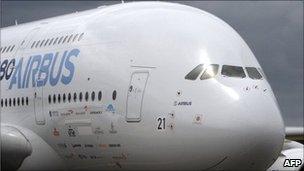
Airbus orders are at stake over the mounting battle
The latest ruling at the European Court of Justice that the EU can indeed tax the emissions of airlines flying to and from the 27 member countries is just the latest step in a growing trade war.
Non-EU carriers say the charges are illegal under international law, while last week the US Secretary of State Hillary Clinton said America would respond with "appropriate action" if the scheme went ahead.
From 1 January next year, the EU plans to make any airline that wishes to land or take off inside the EU take part in the regional bloc's emissions trading scheme.
This is a first for a sector that, by international agreement, pays no tax on its fuel or its emissions.
Environmental benefit
"It's really very straightforward," says James Cameron from Climate Change Capital, which invests in the carbon market.
"This is an important sector of the economy that produces significant greenhouse gas emissions. We have found it necessary as a society to regulate those emissions, so this sector is covered."
Environmentalists hope it will set a benchmark, eventually forcing global industries - such as airlines and shipping companies - into reducing their emissions.
"The whole aviation emissions debate is almost a microcosm of what is happening on the world stage with efforts to reduce climate change," says Jean Leston from the WWF environmental campaign group.
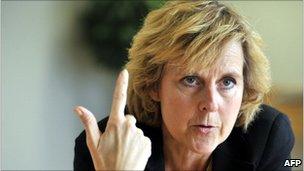
EU Climate Action Commissioner Connie Hedegaard has shown no signs of backing down
The UN IPCC (Intergovernmental Panel on Climate Change) estimates that aviation accounts for 3% of total carbon dioxide emissions - and this is likely to rise.
Shipping, which accounts for a similar amount, may eventually also be brought within the scheme.
For opponents of the move, the stakes are high.
Retaliation risk
The latest ruling is the result of legal action American airlines, backed by the US Air Transport Association, brought against the plans at the European Court of Justice.
But it's not just the Americans that are upset.
During this year's Paris air show, there were reports that China was stalling on a Hong Kong airlines order with European planemaker Airbus because it was unhappy that its airlines would have to buy credits to fly to the EU.
Four Chinese airlines have opposed the scheme which they say could cost them 95m euros ($124m, £79m).
The EU responded defiantly. "We don't work on the basis of threats, but on discussions," said commission spokesman Isaac Valero Ladron, a position it has stuck to ever since.
Yet those who want the idea shelved are unlikely to back down.
The International Air Transport Association (IATA) and its affiliates in the US, Asia and China have all declared their opposition to the plan.
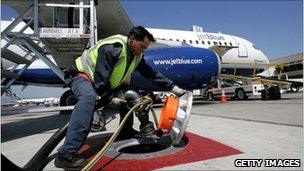
Airlines pay no tax on their fuel
The Chinese Air Traffic association has also threatened the EU with legal action.
In the US, the bipartisan congressional transportation committee has passed a bill which would make it illegal for US airlines to take part in the scheme.
In Europe, Airbus and some national carriers are urging the EU to modify its plans to avoid a costly trade war.
Airbus head Tom Enders said it was "madness to risk retaliation" on the issue.
A tax or an incentive?
The main objection is to the EU's plans to tax all airlines, even if they are flying to or from Europe.
"From the moment they made that decision, we've felt it was unhelpful," said IATA's Chris Goater.
IATA says the move is in effect a tax imposed on airline emissions and so may break international conventions.
They also claim it is "extra-territorial", imposing EU law on airlines flying in international airspace.
The EU disagrees on all points.
"This is not a tax, it's a pollution saving," says the EU's Mr Valero.
Under the scheme, he explains, a pot of carbon credits will be created, set at 97% of the aviation industry's 2004-6 emissions.
These will be divided up between carriers according to how much pollution their flights caused in 2010.
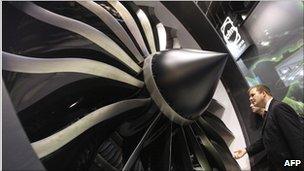
New engines are designed to reduce fuel use
Airlines will get 85% of their permits free, with the remaining 15% being auctioned.
Because so many are given away, the EU says the whole scheme will add just over £2 to a London-to-New York flight.
If airlines want more, they have to buy them, but equally if they have too many, they can sell them to other carriers.
"For example, British Airways, if they emit less than the cap, they have extra allowances which they can sell to make a profit," said Mr Valero.
The aviation industry does not think this outcome will be very common. The latest figures from IATA show air passenger traffic grew by 8.2% in 2010.
"Our estimates are that it would add close to one billion euros ($1.4bn, £862m) in the first year on to the industry's costs and this is an the industry running on a margin of 0.7%," said Mr Goater from IATA.
If the cost of carbon rises, or airlines need to buy more credits because of their expansion, the cost per passenger will rise too.
Asian carriers
The scheme has also been criticised for penalising fast-growing airlines, which will have to buy credits to expand.
This may be partly why the Chinese and Asian carriers have objected so strongly.
"The fastest-growing sources of aviation emissions are in exactly those developing countries who are seeking to have the headroom to grow," says the WWF's Jean Leston.
The WWF wants the scheme modified to ensure developing countries receive financing for renewable energy and climate change mitigation.
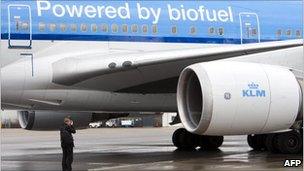
Airlines are looking at alternative fuels to reduce emissions
Global deal
But IATA is calling for the EU to abandon the measure entirely in favour of an international solution.
A UN body, ICAO, has been charged with coming up with such a deal since 1997.
IATA claims airlines have already reduced their emissions by 80% per passenger through more fuel-efficient jets.
In June, KLM announced plans to run a small number of commercial flights on fuel derived from cooking oil.
American Airlines, one of the companies fighting the scheme, has announced it is investing $40bn (£25bn) in new fuel-efficient aircraft.
"We don't intend to back down, modify, withdraw or amend our legislation at all," says Mr Ladron in response, echoing the stance of his holidaying boss, Climate Action Commissioner Connie Hedegaard.
She has been advocating a solution that would give any country introducing its own steps to reduce aviation emissions by the same amount exemption under the EU's rules.
This may offer a possible compromise with China.
It has already said it wants to reduce aircraft emissions by 22% compared with what would have happened if it did nothing.
However, airlines say competing schemes like this will simply increase confusion - and there has been no sign of any environmental measures from the US.
With Congress instead planning to bring forward legislation, Ms Hedegaard may be wishing she could remain on leave for some time to come.
- Published6 June 2011